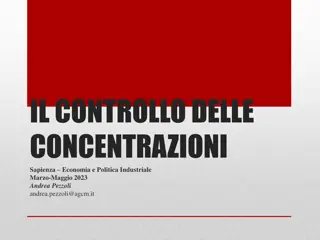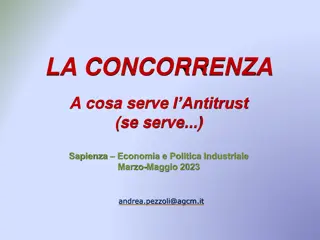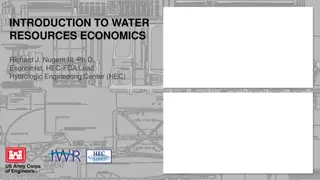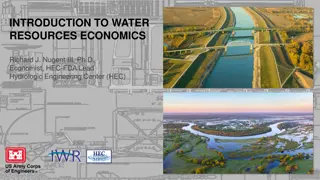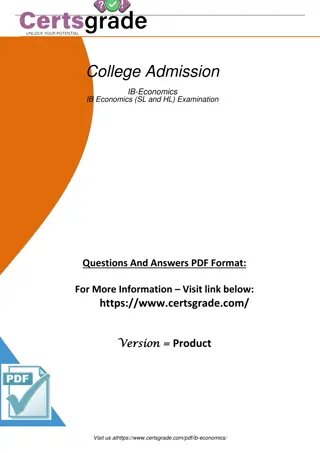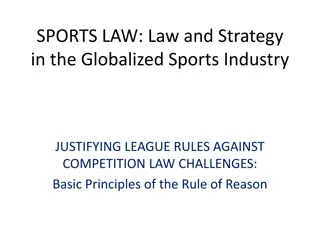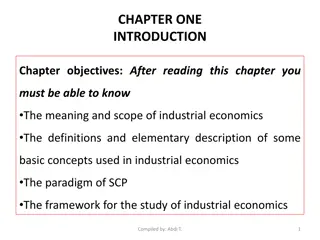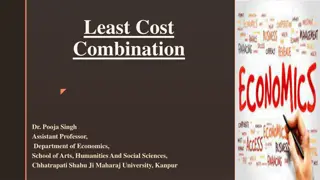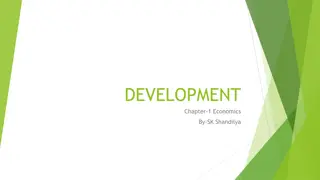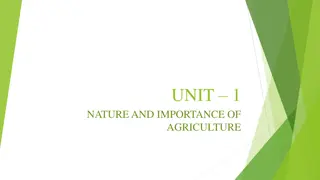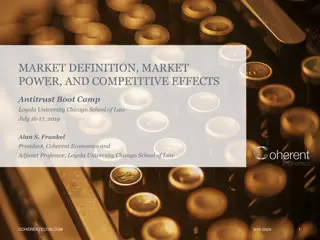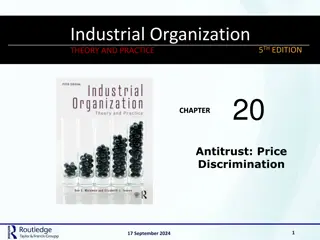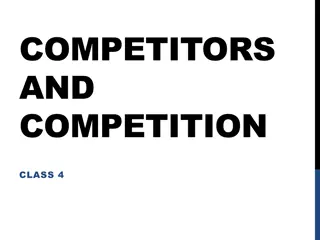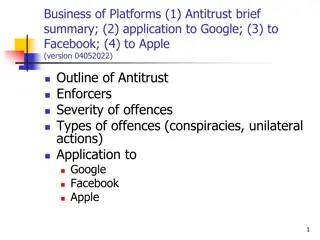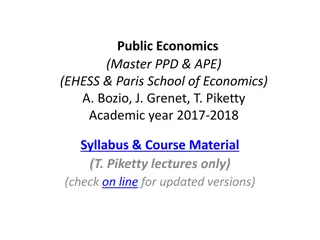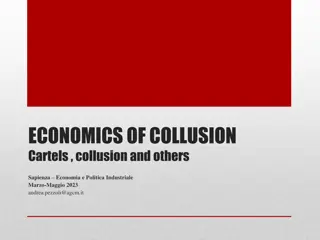Concentration Control in Economics and Industrial Policy
Explore the topic of concentration control in economics and industrial policy, covering recent developments, horizontal and non-horizontal mergers, market power of digital platforms, post-merger evaluations, and calls for stricter merger regulations. Empirical evidence indicates a rise in market con
1 views • 75 slides
Antitrust: Role, Objectives, and Challenges in Modern Economics
Antitrust laws aim to promote fair competition, protect consumer welfare, and uphold economic efficiency. The Antitrust authority plays a crucial role in preventing abuses, cartels, and monopolies, ultimately benefitting consumers through lower prices, innovation, and choice. The evolving landscape
7 views • 73 slides
Water Resources Economics
This resource introduces the principles of water resources economics, focusing on decision-making, cost-benefit analysis, and the role of economics in flood risk management and national development. It discusses how economics influences individual and government decisions in managing limited resourc
3 views • 14 slides
Introduction to Experimental Economics by John Hey: A Comprehensive Overview
Explore the interconnected realms of Experimental Economics and Behavioral Economics through the insightful lectures of John Hey, an Emeritus Professor at the University of York. Discover the methodology of testing economic theories for validity and the practical applications of experimental economi
2 views • 58 slides
Water Resources Economics and Public Policy
Explore the foundations of water resources economics through topics such as decision-making, public economics perspectives, flood control acts, cost-benefit analysis, and optimization. Gain insights into how economics influences individual, household, organizational, and governmental decision-making
4 views • 15 slides
Economics as a Leaving Certificate Subject
Economics as a Leaving Certificate subject prepares students for diverse career paths in business, finance, and management. The course includes a research project and a structured exam format. With a focus on theory, practical application, and real-world economic concepts, Economics equips students
5 views • 11 slides
Elevate Your Scores Master the IB Economics (SL and HL) Examination
Unlock your potential and excel in the IB Economics (SL and HL) Examination with our comprehensive study resources. Access practice exams, study guides, and expert tips to boost your scores. Start your journey towards academic success now!\nClick Here to Get IB-Economics Dumps With 16 USD Discount C
0 views • 7 slides
Sustainable Development and Industrial Policy in the Era of Digital Platforms
The presentation discusses antitrust and industrial policy for sustainable development in the context of born global digital platforms. It covers neoclassical economic approaches, policy interventions for market failures, and organizational economics, focusing on value creation at different levels.
0 views • 11 slides
Navigating Antitrust Investigations with LDM Global
In today\u2019s complex business landscape, antitrust regulations have become a critical area of focus for companies operating in the United States. Navigating these regulations requires expertise and precision, particularly when facing investigations that could impact your business's reputation and
1 views • 13 slides
Horizontal Mergers and Antitrust Laws
Explore the concept of horizontal mergers and various types of mergers like vertical and conglomerate with real-world examples. Learn about the impact of mergers on market dynamics, profitability, and reasons why firms merge. Dive into the interplay between antitrust laws and merger trends, uncoveri
0 views • 19 slides
The Positive/Normative Distinction in Economics
Textbooks in economics often teach the Positive/Normative Distinction, where Positive Economics deals with facts and Normative Economics focuses on values and opinions. This distinction is a point of debate among scholars, with some arguing that values are intrinsic to all analysis. The debate also
1 views • 28 slides
Fiscal Policy Options in Economics
Explore the evolution of economic theories including classical economics, demand-side economics, and supply-side economics. Learn about the impact of key figures like John Maynard Keynes and Milton Friedman on fiscal policy decisions and the U.S. economy. Delve into the strategies employed during th
1 views • 18 slides
Strategic Insights into Antitrust in the Sports Industry
Exploring the intersection of sports and antitrust law, focusing on justifying league rules against competition law challenges, the importance of legal counsel in strategic outcomes, policy foundations of competition, and the basics of antitrust in sports leagues.
1 views • 18 slides
Overview of Industrial Economics: Scope, Evolution, and Challenges
Industrial economics delves into economic issues of firms and industries, exploring their interactions with society. This chapter discusses the meaning and scope of industrial economics, its historical evolution from classical to contemporary theories, traditional concerns like firm performance and
1 views • 71 slides
The Standard Economic Model and Behavioral Economics
The standard economic model, rooted in neo-classical economics, assumes rational behavior with full information and known preferences. In contrast, Behavioral Economics integrates insights from psychology to provide a more nuanced understanding of consumer behavior.
0 views • 30 slides
Navigating the Complex World of Antitrust Law with LDM Global
In today\u2019s dynamic business environment, maintaining fair competition is crucial for a healthy market economy. Antitrust laws, designed to prevent monopolies and promote competition, play a pivotal role in ensuring that businesses operate on a l
1 views • 13 slides
Principles of Least Cost Combination in Economics
In economics, the principle of least cost combination involves determining the optimal combination of factors of production (such as capital and labor) that allows a firm to achieve maximum output at minimum cost. This is achieved by identifying the point where the isoquant curve intersects the isoc
1 views • 4 slides
Overview of Health Economics: Key Concepts and Principles
Health economics is a vital field that explores the relationship between economics and healthcare, focusing on efficiency, value, and behavior in health production and consumption. It encompasses topics like determinants of health, demand and supply of healthcare, health sector budgeting, and equity
1 views • 12 slides
Overview of Development Economics and Goals
Development economics is a branch of economics that focuses on improving the economies of developing countries by targeting factors such as health, education, working conditions, and policies. It involves macroeconomic and microeconomic analysis to enhance domestic and international growth. Differen
3 views • 11 slides
Qualities of a Successful Economics Teacher
The role of an economics teacher is crucial in shaping students' understanding and knowledge. The qualities of an effective economics teacher include expertise in economics, mastery of teaching methodologies, use of innovative teaching techniques, and a commitment to ongoing professional development
4 views • 6 slides
Economics of Competition Policy in Antitrust Practice
Understanding the importance of economics in antitrust practice is crucial as it involves applying economic concepts like markets, competition, and market power. Economists play a significant role in developing case theories and evidence, making economics indispensable in dealing with competition ag
1 views • 38 slides
Oligopoly and Game Theory in Antitrust Economics
Oligopoly theory explores the dynamics of competition among a few large firms that impact pricing strategies. Industries range from competitive to monopolistic based on market structure. Game theory analyzes strategic interactions among firms in oligopolistic markets, influencing decisions and outco
0 views • 24 slides
The Significance of Agriculture Economics in India
Agriculture plays a crucial role in the Indian economy, contributing significantly to GDP and rural livelihoods. Agriculture Economics involves the study of resource allocation in the production, distribution, and consumption of agricultural goods. This branch of economics blends principles from gen
0 views • 24 slides
Antitrust Laws: Market Definition and Power Analysis
The economic purpose of antitrust laws is to ensure overall economic efficiency by focusing on whether a practice benefits or harms consumers. Antitrust cases involve defining relevant markets and assessing market power, distinguishing between market power and monopoly power. Understanding these con
0 views • 20 slides
Antitrust Compliance Guidelines for Society of Actuaries Members
Guidelines for active participation in the Society of Actuaries, ensuring compliance with antitrust laws to avoid anti-competitive behavior during association activities. The guidelines emphasize avoiding discussions on sensitive topics like pricing, market allocations, and trade conditions to preve
0 views • 51 slides
Antitrust and Price Discrimination: Robinson-Patman Act Overview
The Robinson-Patman Act, a significant antitrust statute, aims to prevent price discrimination that harms competition, particularly targeting sellers granting discriminatory prices. While some price discrimination can enhance efficiency, predatory discrimination poses a serious threat to competition
0 views • 30 slides
Institutional Framework and Antitrust Law in the EU
The European Union's institutional framework is defined by the Treaties of Lisbon, European Union, and Functioning of European Union. These treaties establish the EU's objectives, governance principles, and delineate competences. Additionally, EU antitrust law principles are based on the Treaties of
0 views • 16 slides
Update on Pharmacy Legal Actions & Antitrust Cases
Explore the latest insights on pending class action lawsuits and antitrust claims impacting independent pharmacies, including discussions on current cases, the role of FTC, and the Rutledge v. PCMA lawsuit. Learn about class actions, certification processes, and important legal considerations in the
0 views • 20 slides
Implementation of Antitrust Damages Directive: Romanian Experience
In Romania, the transposition of the Antitrust Damages Directive involved key steps such as consultations, legal amendments, and drafting a new Act on Antitrust Damages Actions. The process also included decisions to adopt a new Act on Damages Claims for competition law breaches, addressing issues l
0 views • 9 slides
Competition in Market Structures & Antitrust Laws
Competition is the driving force in various market structures. Competitors make strategic choices that impact each other directly or indirectly. Antitrust laws prevent anti-competitive behavior like monopolies. The SSNIP test helps identify relevant markets for assessing competition. The case study
0 views • 12 slides
Economics: Demand, Supply, and Equilibrium
Explore the fundamental concepts of economics, including the nature and scope of economics, demand, and its determinants. Learn about normative and positive economics, microeconomics, macroeconomics, and the factors affecting demand such as income, price of the good, and complementary goods. Gain in
0 views • 19 slides
Overview of Antitrust Cases and Multistate Enforcement in U.S. Legal History
The content provides a historical overview of significant antitrust cases and multistate enforcement actions in the United States, including key court rulings and landmark legal proceedings involving state participation and enforcement of antitrust laws. It covers cases such as State of Georgia v. E
0 views • 18 slides
Antitrust Overview and Application to Big Tech Companies
Antitrust laws are enforced by agencies like the DoJ, FTC, and European Commission to prevent anti-competitive practices. Violations include conspiracies to fix prices or reduce output and unilateral actions by a single firm. Cartels and conspiracies are illegal, and companies can face severe penalt
0 views • 47 slides
Patent-Antitrust Interface: Balancing IPR and Competition in Developing Countries
Economic growth requires a balance between Intellectual Property Rights (IPR) and competition. Developing countries face challenges in incentivizing innovation while safeguarding consumer welfare. The discussion delves into the complexities of the patent-antitrust interface, emphasizing the need for
0 views • 6 slides
Economics: Explore the World of Scarce Resources, Prices, Government Policies, and Global Impacts
Delve into the intriguing realm of economics with Mr. Moosajee at HGS! Unravel the mysteries behind how scarce resources are allocated, why prices fluctuate, the impact of government policies, concerns about inflation, strategies for reducing unemployment, and more. Discover the relevance of economi
0 views • 20 slides
Public Economics Course Summary - EHESS & Paris School of Economics
The Public Economics course at EHESS & Paris School of Economics offers an introduction to taxation history, government intervention theories, and policy incidence across developed and developing countries. The syllabus covers topics like welfare analysis, wealth taxation, and optimal taxation strat
1 views • 11 slides
Section 1 of the Sherman Act and Antitrust Laws
Section 1 of the Sherman Act prohibits contracts, combinations, or conspiracies that restrain trade or commerce among states or with foreign nations. Violations can result in felony charges, fines, and imprisonment. The section covers various antitrust practices such as price fixing, market division
0 views • 33 slides
Recontracting in Antitrust Regulations
Dive into the complexities of recontracting in antitrust and market power regulations, discussing issues like self-preferencing, leveraging, and pricing strategies by major players like Google, Amazon, and Apple. Explore the implications, legal standards, and regulatory tradeoffs surrounding this to
0 views • 14 slides
Year 11 Economics: Introduction & Learning Outcomes
In Year 11 Economics, students will cover topics like the economic problem, share market, economic systems, market mechanism, and more. The program spans 16 weeks with various assessment tasks. The course explores career paths in economics and empowers students to understand fundamental economic con
0 views • 14 slides
ECONOMICS OF COLLUSION
In this article, the focus is on the economics of collusion, cartels, and practices related to antitrust laws. Discussions revolve around consumer welfare, efficiency, protection of competitive processes, and the detrimental effects of cartels within various economic approaches. The article delves i
0 views • 40 slides
